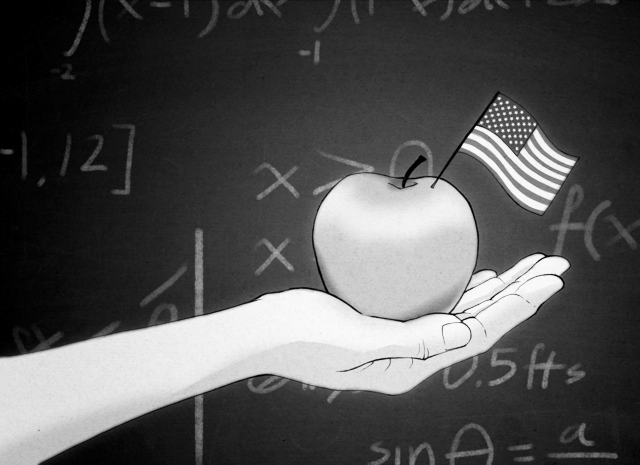
On his first day at the Officer Candidates School in Quantico, Va., math teacher Kent Nealis feared that he had made a grave mistake in his life choices.
He had joined the Reserve Officers’ Training Corps (ROTC), a program that would help him pay for college if he agreed to serve in the military. This meant that he would have to serve in the Marines for four years.
Unaccustomed to the strict nature of the Officer Candidates School, where he was “yelled at by grizzled old officers,” Nealis worried that he had a painful four years ahead.
However, he soon came to enjoy his time in the military.
“It was a great experience,” Nealis said. “I learned how to manage and supervise and lead other people and how to not only give orders, but take orders. I learned what it means to be part of a team. The success of the unit you are in is really dependent on everybody else doing their job.”
Nealis fulfilled his initial commitment to the Marines and continued in the Reserves for 10 more years.
His time in the military gave him confidence in himself, he said.
“We’re capable of a lot more than we think we are,” Nealis said. “The military pushes us and tries to get a lot out of us. I think that’s a good thing.”
After leading a platoon and eventually a company, Nealis left the Marines and pursued a teaching career, which was inspired by his leadership experience, he said.
He is one of many veterans around the country who have pursued teaching careers, said Meghan Stidd, Associate Regional Director at the veterans’ organization Troops to Teachers.
Troops to Teachers is a program managed by the Department of Defense that aims to help veterans become teachers after returning from service.
The organization has helped over 23,000 veterans transition to teaching careers since its inception in 1984, Stidd said.
“This number is expected to increase over the next few years as teacher demand increases and the military continues to draw down the force,” Stidd said.
In the military, veterans learn leadership, focus and flexibility, all skills useful in teaching, he said.
“Military veterans are adaptable and mission-oriented,” Stidd said. “Veterans are also experienced working with individuals from a variety of backgrounds and have a keen sense of cultural awareness. They have training and mentoring experience that directly translates to the teaching profession.”
Nealis attributes his disciplined teaching style to the strict rule-following enforced in the military, he said.
“There are habits I have that translate into the classroom,” Nealis said. “I’m very disciplined in my approach. I have a plan every day about what I want to do. I think following directions is an important life skill.”
Nealis also aims to show his students why the lessons he teaches are important and why his directions are valuable, he said.
“People won’t follow you blindly,” Nealis said. “You need to lead by example, and you need to explain why you’re doing things. I try to always let my students know where I’m going with what I’m talking about.”
Nealis said he cannot discuss in detail where he traveled during his time in the Marines for security reasons, but he visited places all around the world. His time traveling in the military taught him how fortunate he is to be an American, he said.
“Getting to see the peoples of the world, I have such a deep appreciation for the United States and our way of life and the comforts that we have,” he said. “There’s so much poverty in the world. There are so many places that are very difficult places to live.”
For attendance coordinator and veteran Gabe Preciado, most of his knowledge about foreign places came from television.
Although he was born in the United States, he grew up in a Latino community in Pacoima and only learned English when he was six or seven years old, he said.
Preciado said he never truly felt like he understood American culture until he joined the military.
His family didn’t have the money to send him to college, but he wanted to pursue a higher education. The military gave him an opportunity to do so.
“Where we grew up, it was where there weren’t a lot of opportunities,” Preciado said. “We lived on a lower socioeconomic scale, and I didn’t have much money to go to college. So when the recruiters reached out to us, they said, ‘The only way to go to college and to have money to pay for it is to join the military.’ ”
Preciado joined the Air Force when he was 18 and repaired fighter planes. He enjoyed the work and loved the planes, and he appreciated the fact that the military trusted him with important responsibilities.
“You grew up fast,” Preciado said. “They put a lot of trust on an 18-year-old. It made you proud that you were doing something for your country. I really value that. I think it made me become really patriotic.”
Preciado also learned about cultures he had never experienced before.
“I grew up in a really Latino community,” he said. “All the stores, everything was in Spanish. So getting out there and learning all the different dialects, the people from the south, the New Yorkers, the Bostonians. For me, I was like, I only get to see that in movies. It was really refreshing.”
After leaving the Air Force, Preciado attended the Master’s College in Santa Clarita, where he received a B.A. in Theological Studies.
He enjoys working with technology and helping out young adults, and he found that he was able to combine these passions as an Attendance Coordinator, he said.
The discipline, responsibility and confidence he learned in the military are important in helping him succeed at his current job, he said.
Preciado also said that his time in the military made him more politically aware. With the presidential election coming up, Preciado is trying to decide which candidates will respect the needs of veterans, he said.
He never actually served in combat, and veterans currently returning to the United States from service abroad have faced far more harrowing experiences than he did, he said.
“Now the veterans that come out, they face huge challenges,” Preciado said. “A lot of them have to serve in wartime conditions. Looking out for their interests is on my mind. Some of them have so many emotional hurdles to go through. Guys who were in the military realize that. We know that. And when they come out, they have to start over again.”
For performing arts teacher Alex Kolmanovsky, serving in the military gave him the opportunity to go to college and eventually pursue his love of set design. However, unlike many veterans, he originally came from Russia and served in the U.S. Army during the Cold War.
The USSR wanted Kolmanovsky to join the Russian army, but he refused and faced a jail sentence. He emigrated before the police could catch him and came to the United States in the 1970s, eventually joining the military.
“It was not easy to go through the U.S. Army training on a good day,” Kolmanovsky said. “Being a perceived enemy added extra fuel to the rigors of training. I had to be good.”
After leaving the army, Kolmanovsky pursued his love of visual arts and set design. He said his experience in the army is useful when designing scenes for military films or theatrical sets.
“As scenic designers, we represent life on stage or screen,” Kolmanovsky said. “It helps when I design scenery for a military film or a theatrical set to know the visual semiotics of military life. Those designers who haven’t been in the military themselves almost always miss the quintessentials.”
Kolmanovsky said he always wanted to be a scenic designer.
He enjoys his job at Harvard-Westlake, but he sometimes ponders his time in Russia and what came of his escape from the police, he said.
“I wonder if they’re still looking for me,” Kolmanovsky said.
Some students hope to join the military in the future. Gabe Golob ’16 will attend the U.S. Naval Academy next year so that he can eventually serve in the Navy.
Golob, a baseball player, first considered joining the military in his sophomore year when he met the pitching coach at the Naval Academy.
“The idea of being a part of something bigger than myself and being a part of something meaningful initially inspired me,” Golob said. “In addition, the Naval Academy allows me the opportunity to play Division I baseball for the next four years.”
Soon after meeting the pitching coach, he decided he wanted to attend the Naval Academy.
His family, friends and coaches were supportive of him and encouraged him to pursue his goal.
Golob said he feels the rigor and demand for excellence at Harvard-Westlake prepare students well for the Navy.
“I believe that Harvard-Westlake students are the most qualified people to succeed at the military academies because we are used to being under pressure, managing our time and are very smart and athletic,” Golob said. “I wish more students considered the options the academies offer.”



























